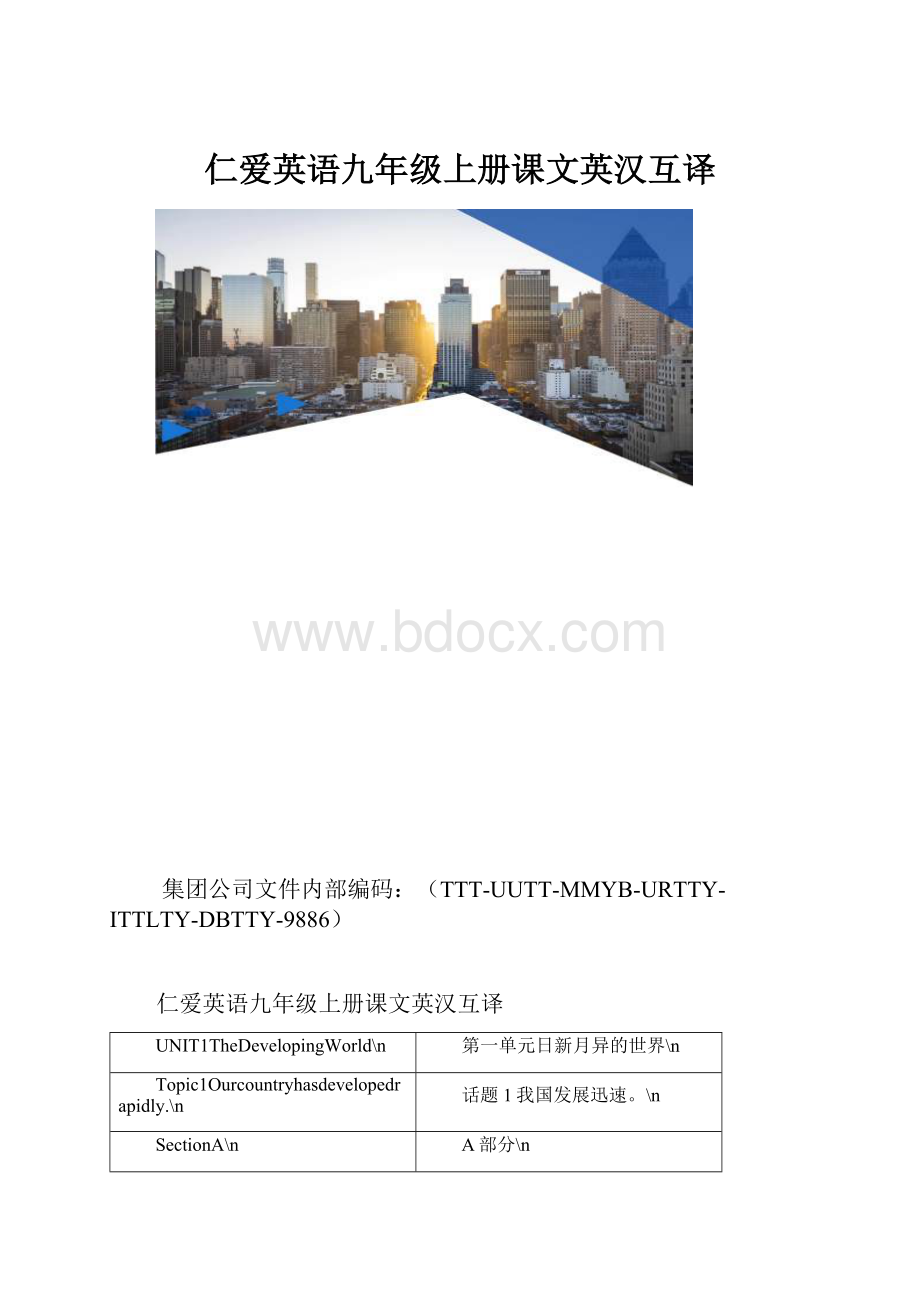仁爱英语九年级上册课文英汉互译.docx
《仁爱英语九年级上册课文英汉互译.docx》由会员分享,可在线阅读,更多相关《仁爱英语九年级上册课文英汉互译.docx(84页珍藏版)》请在冰豆网上搜索。

仁爱英语九年级上册课文英汉互译
集团公司文件内部编码:
(TTT-UUTT-MMYB-URTTY-ITTLTY-DBTTY-9886)
仁爱英语九年级上册课文英汉互译
UNIT1TheDevelopingWorld\n
第一单元日新月异的世界\n
Topic1Ourcountryhasdevelopedrapidly.\n
话题1我国发展迅速。
\n
SectionA\n
A部分\n
1aLook,listenandsay\n
1a看,听,说\n
(Intheclassroomafterclass)\n
(课后在教室)\n
Kangkang:
Hi,Jane.Didyouhaveagoodsummerholiday?
\n
康康:
嗨,简。
暑假过得好吗?
\n
Jane:
Yes.Whataboutyou?
\n
简:
好。
你呢?
\n
Kangkang:
Notbad.Rita,youhavejustcomebackfromyourhometown.Howwasyourtrip?
\n
康康:
还不错。
丽塔,你刚刚从你的家乡回来,旅途怎么样?
\n
Rita:
IwenttomanyplacesnearmyhomeinIndia.\n
丽塔:
在印度,我去了家附近的很多地方。
\n
InoneplaceIsawchildrenworkingforacruelboss.\n
在一个地方我看到孩子们正为一个残忍的老板干活。
\n
Ifeltsorryforthem.Wherehaveyoubeen,Jane?
\n
我很同情他们。
简,你去过哪里?
\n
Jane:
IhavebeentoMountHuangwithmyparents.\n
简:
我和我父母去过黄山。
\n
It’sabeautifulplace.\n
是个美丽的地方。
\n
ButthereweresomanypeopletherethatIcouldn’tfindaproperplacetotakephotos.\n
但是人太多,我没能找到一个好地方拍照。
\n
Andwherehaveyoubeen,Kangkang?
\n
康康,你去过哪里?
\n
Kangkang:
IhavebeentoanEnglishtrainingschooltoimprovemyEnglish.\n
康康:
我到英语培训学校提高英语去了。
\n
Jane:
Bytheway,where'sMaria?
\n
简:
顺便问一下,玛丽亚在哪?
\n
Kangkang:
ShehasgonetoCubatobeavolunteerandshewillbebacktomorrow.\n
康康:
她去古巴当志愿者了,明天回来。
\n
Rita:
Listen!
Theregoesthebell.\n
丽塔:
听!
铃响了。
\n
SectionB\n
B部分\n
1aListen,readandsay\n
1a听,读和说\n
Kangkang:
Hi,Maria!
Haveyouevertakenpartinanysocialactivitiesduringsummerholidays?
\n
康康:
嗨,玛丽亚!
暑假你参加过社会活动吗?
\n
Maria:
Yes,Ihavebeenavolunteerinadisabledchildren’shome.\n
玛丽亚:
是的,我到残疾儿童之家当志愿者了。
\n
Kangkang:
Cool!
Haveyouevertoldstoriestothedisabledchildren?
\n
康康:
酷!
你有没有讲故事给残疾儿童听呢?
\n
Maria:
Yes,Ihave.\n
玛丽亚:
是的。
\n
Kangkang:
Haveyoueverfedthedisabledchildren?
\n
康康:
你给残疾儿童喂过东西吗?
\n
Maria:
No,Ihaven't.ButIhavecleanedtheirrooms.\n
玛丽亚:
没有,但是我打扫了他们的房间。
\n
Kangkang:
Whatawonderfulexperience!
\n
康康:
多好的经历啊!
\n
Maria:
Yes,itwas.Ilearntalotfromit.\n
玛丽亚:
是呀。
我从中学到很多。
\n
ThoughIhadnotimetotravel,Istillfeltveryhappy.\n
虽然我没有时间去旅行,但是我仍然感到很开心。
\n
2aListen,readandsay\n
2a听,读和说\n
Rita:
Kangkang,I’dliketowriteanarticleaboutteenagersaroundtheworld.\n
丽塔:
康康,我想写一篇关于全世界青少年的文章。
\n
CouldyoupleasetellmesomethingaboutChineseteenagers?
\n
你能告诉我一些关于中国青少年的事情吗?
\n
Kangkang:
Sure.Mygrannytoldmethatmostchildrenhadahardlifeinthepast.\n
康康:
当然,我奶奶告诉我,过去大多数小孩过着艰苦的生活。
\n
Rita:
Isthatso?
Canyoudescribeitindetail?
\n
丽塔:
是那样吗?
你能详细描述一下吗?
\n
Kangkang:
Well,inthepast,manyfamilieswerebigandpoor.\n
康康:
嗯,过去,许多家庭都很大很穷。
\n
Parentscouldn’taffordaneducationfortheirchildren.\n
父母供不起孩子上学。
\n
Rita:
Oh,thenhowdidmostchildrenspendtheirchildhood?
\n
丽塔:
噢,那大多数孩子是怎样度过他们的童年的?
\n
Kangkang:
Theyhadtobechildlaborers.Theyworkeddayandnightandneverhadenoughfoodtoeat.\n
康康:
他们得去当童工。
他们日以继夜地工作,从来没有足够的食物。
\n
Cruelbossesevenbeatthem.\n
残忍的老板甚至打他们。
\n
Butinordertohelpsupporttheirfamilies,theyhadtoworkforthebosses.\n
但为了帮助养家,他们不得不为那些老板工作。
\n
Rita:
Whataboutteenagersnowadays?
\n
丽塔:
现在的青少年怎么样?
\n
Kangkang:
Nowourcountryhasdevelopedrapidly.\n
康康:
现在我们国家发展很快。
\n
Thegovernmentgivessupporttopoorfamilies.\n
而且政府向贫困家庭提供帮助。
\n
Sochildrenincitiesandvillagescangetagoodeducation.\n
所以,城市和乡村的孩子都能得到好的教育。
\n
Rita:
Oh,they’relucky.\n
丽塔:
哦,他们很幸运。
\n
2cWorkalone\n
2c独立练习\n
Listentothetapeandfillintheblanks.\n
听录音,填空。
\n
Inthepast,childrenhadlittlefoodtoeatandfewwarmclothestowear.\n
在过去,孩子们只有很少的食物吃、很少的保暖衣服穿。
\n
Mostofthemhadnochancetogotoschoolbecausetheywerepoor.\n
他们中的大多数人没有机会上学,因为他们都很穷。
\n
Andtheyhadveryfewleisureactivities.\n
而且他们几乎没有休闲活动。
\n
Theyhadtoworkaschildlaborersandhelpsupporttheirfamilies.\n
他们不得不去当童工来帮忙养活他们的家庭。
\n
WiththedevelopmentofChina,allthosethingshavechanged.\n
随着中国的发展,所有那些都已经改变了。
\n
Nowadays,Childrenhaveabalanceddietandcanweardifferentkindsofclothes.\n
现在,孩子们有均衡的饮食,可以穿上各种各样的衣服了。
\n
Theycanalsogetagoodeducation.\n
他们还可以获得良好的教育。
\n
What'smore,theyhavechancestodrawpictures,playmusicalinstrumentsandreceivesomeothertraining.\n
而且,他们还有机会去画画,演奏乐器和获得其它一些培训。
\n
SectionC\n
C部分\n
1aReadandunderstand\n
1a阅读理解\n
MyReportonBeijing\n
关于北京的报道\n
Hi!
I'mKangkang.\n
嗨!
我是康康。
\n
MygrannyhaslivedinBeijingformorethanfortyyears.\n
我奶奶在北京生活了四十多年。
\n
ShehasseenthechangesinBeijingherself.\n
她亲眼目睹了北京的变化。
\n
Inthe1960s,thelivingconditionsinthecitywerepoor.\n
20世纪60年代,城市的生活条件很差。
\n
Theroadswerenarrowandthereweren'tmanyringroads.\n
道路很狭窄,没有很多环行路。
\n
Usually,abigfamilywascrowdedintoasmallanddarkhouse.\n
通常,一个大家庭都挤在一个又小又暗的房子里。
\n
Mostfamiliescouldn'tgetenoughfoodandfewchildrenhadthechancetoreceiveagoodeducation.\n
多数家庭都吃不饱,很少有孩子有机会接受良好的教育。
\n
Lifewassohardthatpeoplehadnotimeormoneytoenjoyleisureactivities.\n
生活如此艰难,以致人们没有时间和钱去享受休闲活动。
\n
Peoplekeptintouchwiththeirfriendsandrelativesfarawaymainlybyletterortelegram.\n
人们主要通过信件或电报与远方的亲朋好友保持联系。
\n
Chinahasdevelopedrapidlysince1978.\n
自1978年中国发展迅速。
\n
Moreandmoreringroadshaveappearedandpeople'slivingconditionshaveimprovedalot.\n
越来越多的环行路出现,人们的生活条件有了很大的改善。
\n
BuildingsinBeijingarebecomingtallerandbrighter.\n
北京的建筑变得高而明亮。
\n
Andtherearemorekindsoffoodandclothestochoosefrom.\n
有更多的食物和服装选择。
\n
Peoplecanenjoymoresortsofleisureactivities.\n
人们可以享受更多的休闲活动。
\n
ChildrencanstudynotonlyinmodernschoolsbutalsoontheInternet.\n
孩子们不仅可以在现代化的学校学习而且可以通过因特网学习。
\n
What'smore,communicationsarebecomingeasierandquicker—peoplecanusetelephones,\n
而且,人与人的交流也变得越来越容易和快捷——人们可以用电话,\n
cellphones,faxmachines,theInternetandsoon.\n
移动电话,传真,因特网等等。
\n
Beijinghasmaderapidprogressandithasalreadysucceededinhostingthe2008OlympicGames.\n
北京取得了飞快的进步,它已经成功地举办了2008年奥运会。
\n
Ithinkitisimportanttorememberthepast,liveinthepresentanddreamaboutthefuture.\n
我认为记住过去,立足现在,展望未来是非常重要的。
\n
SectionD\n
D部分\n
1Workalone\n
1独立练习\n
Listentothetapeandfillintheblanks.\n
听录音填空\n
Thereisaverypopularorganizationforyoungpeopleinourcommunity.\n
在我们社区里有一个非常受年轻人欢迎的组织。
\n
Ijoinedittwoyearsago.\n
两年前我加入了这个组织。
\n
AndIhavetakenpartinmanyinterestingactivities.\n
我参加了很多有趣的活动\n。
Whatwehavedonecannotonlyhelpothersbutalsomakeourselveshappy.\n
我们所做的不仅可以帮助他人而且可以使自己高兴。
\n
LastSunday,wewenttoanoldpeople'shome.\n
上个星期天,我们去了老人之家。
\n
Afterwehelpedthemdosomehousework,wesang,dancedandplayedgameswiththem.\n
在帮他们做完家务后,我们和他们一起唱歌,跳舞和玩游戏。
\n
Theoldpeoplewereexcitedbyourvisit.\n
老人们对我们的来访感到很兴奋。
\n
Theytoldusinterestingstoriesaboutthemselves.\n
他们给我们讲自己有趣的故事。
\n
Weallhadagoodtime.\n
我们都过得很愉快。
\n
Afterthisvisit,myfriendandIdecidedtodomorethingstohelpthem.\n
在探访之后,我朋友和我决定做更多的事情帮助他们。
\n
Now,morethan30volunteershavejoinedourclub.\n
现在,30多名志愿者加入了我们的俱乐部。
\n
Everyonethinkstheexperienceisrewarding.\n
每个人都认为这一体验是值得的。
\n
3aGrammerfocus\n
3a语法重点\n
Presentperfect(I)\n
现在完成时(I)\n
Wherehaveyoubeen,Jane?
\n
你去过哪里,简?
\n
IhavebeentoMountHuangwithmyparents.\n
我跟父母去过黄山。
\n
Haveyoueverfedthedisabledchildren?
\n
你给残疾儿童喂过东西吗?
\n
Yes,Ihave./No,Ihaven't.\n
是的。
/不,我没有。
\n
ShehasgonetoCubatobeavolunteer.\n
她去古巴当志愿者了。
\n
MygrannyhaslivedinBeijingformorethanfortyyears.\n
我奶奶在北京生活了四十多年。
\n
3bUsefulexpressions\n
3b习惯用语\n
Ifeltsorryforthem.\n
我为他们感到可怜。
\n
Isthatso?
\n
是那样吗?
\n
Theregoesthebell.\n
铃响了。
\n
WiththedevelopmentofChina,...\n
随着中国的发展,……\n
ThoughIhadnotimetotravel,Istill...\n
虽然我没有时间去旅行,但是我仍然……\n
Keepintouchwith\n
与……保持联系\n
Unit1\nTopic2Whatalargepopulation!
\n
第一单元\n话题2多么庞大的人口!
\n
SectionA\n
A部分\n
1aLook,listenandsay\n
1a看,听和说\n
Maria:
Hello.Kangkang.Ihavejustcalledyou.butyouweren'tin.Wherehaveyoubeen?
\n
玛丽亚:
你好。
康康。
我刚才打电话给你。
但你不在。
你去哪了?
\n
Kangkang:
MichaelandIhavejustbeentoashoppingcenter.\n
康康:
迈克尔和我去了购物中心。
\n
I'veneverbeentherebefore,butIdon'twanttogothereagain.\n
我之前从来没有去过那里,但是我再也不想去了。
\n
Maria:
Why?
\n
玛丽亚:
为什么?
\n
Kangkang:
Becausethereweretoomanypeople.Wegotlostandcouldn'tfindeachother.\n
康康:
因为那里有太多人了。
我们迷路了而且找不到对方。
\n
Maria:
Badluck!
Haveyoufoundhimyet?
\n
玛丽亚:
真糟糕!
你找到他了吗?
\n
Kangkang:
No,hehasprobablygonehome.Let'scallhimupnow.Ireallyhatetogoshopping.\n
康康:
没有,他可能回家了。
我们现在给他打电话吧。
我真的不愿意去购物。
\n
Maria:
SodoI.\n
玛丽亚:
我也是。
\n
3aListen,readandsay\n
3a听,读和说\n
Maria:
Oh,Kangkang.Whatanicephoto!
Youlookedsocute!
\n
玛丽亚:
噢,康康。
好美的一张照片!
你看起来可爱极了!
\n
Kangkang:
Yes,everybodylovedmesomuchinthosedays.Iwasveryhappy.\n
康康:
是的,那时人人都很爱我。
我很开心。
\n
Maria:
Thefamilyintheotherphotoisverybig.Butitseemsthattheirlivingconditionswerenotverygood.\n
玛丽亚:
在另一张相片里,是一个很大的家庭。
但他们的生活条件似乎不是很好。
\n
Kangkang:
Yes.It'saphotoofmyfather'sfamily.Whenhewasachild,mostfamiliesinourcountryhadatleastthreeorfourchildren.
康康:
是的。
这是我爸爸家的全家福。
当他是个孩子时,我国的大多数家庭至少有三或四个孩子。
\n
Atthattime,Chinahadthelargestpopulationintheworldanditwasnotwelldeveloped.\n
那时,中国有世界上最多的人口,而且经济也不发达。
\n
Maria:
ButgreatchangeshavealreadytakenplaceinChinarecently.\n
玛丽亚:
但是,最近,中国发生了巨大变化。
\n
Kangkang:
Yeah,Chinahasdevelopedalotalready.\n
康康:
是,中国发展得很快。
\n
Becauseoftheone-childpolicy,nowmostfamilieshaveonlyonechild.\n
由于独生子女政策的实行,现在大部分家庭只有一个孩子。
\n
I'mtheonlychildinmyfamily,andIusedtobea"LittleEmperor".\n
我是我家的独生子,我过去就是“小皇帝”。
\n
Maria:
Er,Idon'tthinkthat'sgood.Noonelikes"LittleEmperors".\n
玛丽亚:
嗯,我认为那不好。
没有人会喜欢“小皇帝”。
\n
Kangkang:
Neitherdomyparents.Sotheyareverystrictwithmenow.\n
康康:
我父母也不喜欢。
所以他们现在对我很严格。
\n
SectionB\n
B部分\n
1aListen,readandsay\n
1a听,读和说\n
(Kangkangisreadingareportaboutpopulationinthenewspaper.)\n
(康康在读一篇报纸上关于人口的报道。
)\n
Kangkang:
Wow!
Whatalargepopulation!
\n
康康:
哇!
多么庞大的人口啊!
\n
Maria:
What?
\n
玛丽亚:
什么?
\n
Kangkang:
Look,itsaystheworldhasapopulationof6.5billion.Anditisincreasingby80millioneveryyear.\n
康康:
看,它说世界有65亿人口,而且在以每年八千万的幅度增长。
\n
Maria:
Mmm,that'sreallyalot.Whichcountryhasthelargestpopulation?
\n
玛丽亚:
嗯,那真的很多。
哪个国家的人口最多?
\n
Kangkang:
Chinahasthelargestpopulationwith1.3billion,andIndiaisthesecondwith1.1billion.\n
康康:
中国以13亿人口排在首位,印度以11亿人口排在第二位。
\n
\n
玛丽亚:
美国的人口是多少?
\n
Kangkang:
296million.\n
康康:
2.96亿。
\n
Maria:
Oh,Isee.Itshowsthatthepopulationindevelopingcountriesislargerthanthatindevelopedcountries,doesn'tit?
\n
玛丽亚:
噢,我知道了。
它表明了发展中国家的人口比发达国家的更多,对吗?
\n
Kangkang:
Yes.What'smore,thepopulationindevelopingcountriesisgrowingfaster.\n
康康:
是的。
而且,发展中国家的人口增长得更快。
\n
Maria:
Soitis.Thepopulationproblemismoreseriousindevelopingcountries.\n
玛丽亚:
的确是这样。
发展中国家的人口问题更严重。
\n
Kangkang:
Luckily,Chinahasalreadycarriedouttheone-childpolicytocontrolthepopulation.\n
康康:
幸运的是,中国已经实行了独身子女政策来控制人口。
\n
2aLook,listenandsay\n
2a看,听与说\n
fivehundredandforty-threep